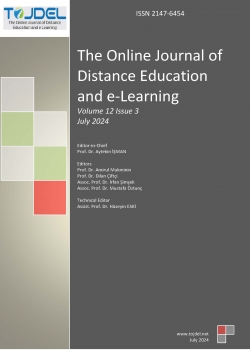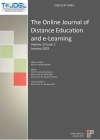TOJDEL - Volume 12 - Issue 3 - July 2024
 ENGAGEMENT IN SOCIAL MEDIA ACTIVITIES AND IT’S IMPACT ON ACADEMIC ACHIEVEMENT AMONG POST GRADUATE STUDENTS
ENGAGEMENT IN SOCIAL MEDIA ACTIVITIES AND IT’S IMPACT ON ACADEMIC ACHIEVEMENT AMONG POST GRADUATE STUDENTS Hanin Badsah, Jakir Hussain Laskar
Abstract:
Social media is experiencing rapid growth among the young generation worldwide. University students are actively engaging with various social media platforms. The goal of the current study is to examine how students use social media for a variety of Using Purposes, Time Spent in social media and the impact on Academic Achievement among postgraduate students. The total number of samples is 80 students, where 40 students selected from Cooch Behar Panchanan Barma University and 40 students selected from the University of North Bengal. In the present study the investigator followed quantitative approach and used descriptive survey method. The researcher should try to ascertain whether there is a significant difference in engagement with social media of postgraduate students on the basis of their Gender, social media Using Purpose and to explore if there are any differences in social media activities between postgraduate students from two Universities and find out the social media impact of two university’s students. Also tries to examine Time Spent in engagement with social media and Academic Achievement of the Students. The result show that there is a substantial disparity in the engagement with social media of male and female postgraduate students and engagement with social media have no substantial impact on Academic Achievement. The investigator also found Time Spent in social media have no substantial impact on Academic Achievement.
 INTEGRATING TECHNOLOGY INTO EDUCATION: A NEW PARADIGM AND A PANACEA IN COVID-19 PANDEMIC
INTEGRATING TECHNOLOGY INTO EDUCATION: A NEW PARADIGM AND A PANACEA IN COVID-19 PANDEMIC Aamir Majeed, Syedah Fawzia Nadeem
Abstract:
In times of uncertainty, survival requires an immediate response, and this paper is a study of how technology has been a panacea to deal with the uncertainty of schooling during the pandemic. The outbreak of COVID-19 forced educators to switch to an online mode of education in order to provide a possible solution to students to continue their education. The paper emphasizes the significance of incorporating technology into education at mass level; it also examines a paradigm shift to online mode of education. The paper will be a helpful document for policy makers to frame the futuristic policies based on integrating technology into education in order to deal with different and uncertain situations.
 ONLINE TEAM DISCUSSIONS: MAKING STUDENT ENGAGEMENT WORTH THE EFFORT
ONLINE TEAM DISCUSSIONS: MAKING STUDENT ENGAGEMENT WORTH THE EFFORT Sarah Wackerbarth, Madeline Aulisio Miller
Abstract:
Facilitating robust engagement in an online, asynchronous course can be difficult. Learning management system discussion boards are often recommended to promote interaction and learning. However, there are many concerns associated with discussion board use such as disengagement, time lags, and inappropriate use of artificial intelligence. The instructor of a required graduate public health course delivered asynchronously online developed and implemented an alternative to discussion boards that required small groups of students to record and submit their discussions. Team members prepared for the discussions by first reviewing course module content and completing an individual assignment. The group discussions required learners to utilize higher-order skills in responses to structured prompts and were graded for depth and participation rather than accuracy. Midsemester feedback survey data indicated that students accepted the recorded discussions and found them valuable. Survey data also enabled the instructor to make small adjustments as needed and recommend best practices for the implementation of this online discussion activity in other courses.
 PROBLEMS ARISING FROM CHILDREN'S USE OF DIGITAL TECHNOLOGIES AND SOLUTION SUGGESTIONS
PROBLEMS ARISING FROM CHILDREN'S USE OF DIGITAL TECHNOLOGIES AND SOLUTION SUGGESTIONS Dönay Nisa Kara, Tubanur Çelik İskifoğlu
Abstract:
In recent years, children's socialization and games with peers in neighborhoods and parks have become virtual games in which they spend their free time in front of the computer. Today, many digital games have emerged with the effect of technological developments. Playing digital games and using social media for long hours causes many social, physical and psychological conditions. Excessive use paves the way for many diseases and mental health problems. Especially in recent years, applications to clinics have increased due to the problems created by digital games. When the literature is examined, there are limited studies on children's digital gaming tendencies.
The aim of this study; To raise awareness that children will experience physical and psychological problems due to excessive and aimless use of technology and to draw attention to the issue by making a short compilation on the subject.
 REDUCING THE LEARNING DISPARITY: IMPLEMENTING EQUITABLE ONLINE AND DIGITAL LEARNING
REDUCING THE LEARNING DISPARITY: IMPLEMENTING EQUITABLE ONLINE AND DIGITAL LEARNING Mina SABAR
Abstract:
The emergence of pandemics and epidemics have brought attention to the urgent need for substitute forms of high-quality education, prompting the National Education Policy 2020 to support the use of technology to solve new issues. The article explores the necessity of using technology to close the digital gap and provide high-quality education. Key initiatives from NEP-2020 are covered, including improvements in digital infrastructure, online teaching platform and tool improvement, and online education pilot studies. The article additionally takes a look at mass media and virtual labs as means of tackling the digital gap and creating and disseminating content.
 THE PEDAGOGY OF EMPATHY AND ITS IMPACT AT AN ONLINE SCHOOL IN GREECE
THE PEDAGOGY OF EMPATHY AND ITS IMPACT AT AN ONLINE SCHOOL IN GREECE Georgios Kosyvas, Eftihia Papahsristou
Abstract:
The suspension of schools during the academic year 2020-2021 due to the coronavirus outbreak necessitated establishing an "Online School" to meet the multifaceted needs of students with serious health problems. This paper addresses the creation of an online environment of safety and care in which vulnerable teachers delivered teaching applying the pedagogy of empathy, a holistic approach to develop the cognitive and emotional skills of vulnerable students. This research is qualitative with fifty teachers and fifteen students getting interviewed using open-ended interviews and the method of qualitative content analysis. The purpose of the study was to investigate the impact of empathy pedagogy on students' learning outcomes and highlight the factors that empowered students and teachers. According to the findings of the study, empathy pedagogy and particularly the cognitive, affective, communicative and sociocultural pedagogical components had a motivational effect on vulnerable students’ academic achievements contributing to quality and inclusive education.
 TO STUDY THE INTEGRATION OF QR CODES IN TEXTBOOKS & THE PERCEPTIONS OF THE INTEGRATION BY IN-SERVICE TEACHERS AT GOVERNMENT SCHOOLS IN ANANTAPUR DISTRICT OF ANDHRA PRADESH
TO STUDY THE INTEGRATION OF QR CODES IN TEXTBOOKS & THE PERCEPTIONS OF THE INTEGRATION BY IN-SERVICE TEACHERS AT GOVERNMENT SCHOOLS IN ANANTAPUR DISTRICT OF ANDHRA PRADESH Manohar Srinivas Naik R, G.L.N Prasad, Dr.B. Sreedevi, Manohar Srinivas Naik R, Andhra Pradesh
Abstract:
The advent of novel technologies has brought out innovative methods of instruction and acquisition of knowledge. An example of such an innovation is the Quick Response (QR) code. The incorporation of QR codes into cellphones holds significant potential as a valuable tool for schools. In the academic year 2018-2019, the Department of School Education in Andhra Pradesh introduced textbooks containing QR codes to students in classes VI-X for subjects including mathematics, physical science, and biology. This was the first time such textbooks were used in India. Contemporary textbooks now incorporate QR codes, which allow students to scan and access more information on specific subjects, experiments, concepts, and procedures within the scientific method. Students can utilize the codes to gain entry to digital resources, such as text, as well as multimedia content like interactive animations, photographs, and videos. The objective of this research study is to investigate the implementation of QR codes in the textbooks of government schools in the Anantapur district of Andhra Pradesh state, as well as to assess the opinions of the present teaching staff regarding this integration. Data was collected via a survey that employed a Likert scale consisting of five points. A random selection was made of twenty-five educators who are currently employed in public schools in Anantapur district to participate in the data collecting. Based on the primary findings, 64 percent of the teachers currently employed believed that utilizing QR codes was a straightforward and efficient method to improve learning. Furthermore, the majority of individuals expressed a positive attitude towards the QR codes, with eighty percent indicating their intention to utilize the application for work-related endeavors in the future. The research featured informative examples of how QR codes were integrated into the classroom. Textbooks equipped with QR codes enable students to engage in self-directed study at their convenience. The incorporation and improvement of existing instructional techniques, through the utilization of QR codes, introduced a fresh and stimulating aspect to the process of learning in the classroom.
 UNDERGRADUATES’ ATTITUDES TOWARDS THE USE OF E-LEARNING FOR LEARNING IN KWARA STATE, NIGERIA
UNDERGRADUATES’ ATTITUDES TOWARDS THE USE OF E-LEARNING FOR LEARNING IN KWARA STATE, NIGERIA Foluke Nike Bolu-Steve, Samuel Olateru, Gboyega Ayodeji Aladesusi
Abstract:
E-Learning, is significant mode of education, transforming the way human access and acquire knowledge, it equally facilitates learners’ access to course materials and available resources through any internet-connected location. This study, therefore assessed students’ attitudes towards e-learning espousing in Kwara State. The study also examined the influence of moderating variables of age and gender on attitude towards e-learning. The research design adopted is the descriptive research of survey. The sample for this study was 396 undergraduates in Kwara state. A researcher-designed structured questionnaire titled “Attitude Towards E-learning Scale” (ATES) was utilized to collect study data. The findings revealed that undergraduates in Kwara state have positive attitude towards e-learning. In addition, there was a noteworthy distinction in Kwara State undergraduates' attitudes on e-learning according to gender, but not according to age. The study's recommendations were based on the findings, which suggested that guidance counsellors provide gender-sensitive help by adjusting tactics and suggestions to accommodate the unique obstacles that male and female students have while embracing e-learning. It was also suggested that counsellors should offer age-appropriate advice, such as guiding younger students toward the development of efficient time management techniques and helping older students advance their technological proficiency. This will help newcomers adjust to the online learning environment by exposing them to techniques that will inspire them.


